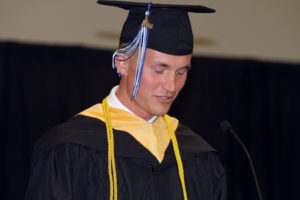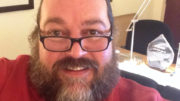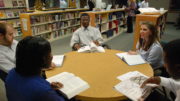 Ian Faulkenberry in His Own Words
Ian Faulkenberry in His Own Words
Typically, in a commencement speech, the speaker will provide you with an inspiring quote, the definition of the word commencement, or maybe a Robert Frost poem about diverging roads in a yellow wood. But ECPI University is not a typical school, and we are not typical graduates, so we’re going to skip all of that.
I’d like to take a moment to just say: You made it…you’re here! Let’s enjoy this. Now, if there’s anything I’d ask you to reflect on, it would be your initial motivation for coming to school. What was your main worry when you first enrolled?
I’m sure you had a lot of hope for the future, but hope is about more than expectations. It has to be combined with a lot of effort, which you’ve obviously put in, and it has to be resilient enough to endure failure and the everyday setbacks of life.
If you put in the effort and still fail, that effort—and the hope it sprang from—will never die. That energy and intent will ultimately result in something positive and meaningful. That type of failure isn’t really a loss.
[Tweet ““For a lot of us, success didn’t come overnight; it didn’t come without commitment or sacrifice – and it was likely preceded by procrastination and doubt; that’s something we can share with others who may need a mentor one day.” Ian Faulkenberry, Cyber and Network Security Graduate Greenville Campus”]
A lot of people may look at me and think it was easy for me to get into college and to graduate, but my path to this spot on the stage was anything but easy. I don’t even have a high school diploma – I have a GED. When I was in high school, my sister passed away, and I went kind of crazy for a while. In my senior year, I pulled my GPA up to about a 2.8, but three months before I was scheduled to graduate, I got into some trouble and wasn’t allowed to.
Later, I could relate all the reasons I hadn’t done certain things in life yet, but truthfully, I never took the work seriously enough – even before the trouble started. Fast forward a few years – I was married, my wife had a good job, and I felt like I wasn’t pulling my weight. I had friends who’d gone into fields like engineering and were making close to six figures, and I knew I didn’t want to be doing hard labor when I was sixty years old.
Eventually, when I was a telecomm tech, pulling cable in all kinds of weather – day and night – I was inspired by someone I worked with who became somewhat of a mentor to me. He’s now a network administrator in Atlanta. But before I get into my experience at ECPI, I have to go back to some of those failures I alluded to earlier – the type that are truly a loss.
I went to Greenville Tech. for two years, and while I was there, I didn’t do a whole lot except get really good at plagiarizing. As I stand here today, certainly, I’m ashamed of some of the things I did, but I realize I shouldn’t be ashamed to talk about them.
For a lot of us, success didn’t come overnight; it didn’t come without commitment or sacrifice – and it was likely preceded by procrastination and doubt; that’s something we can share with others who may need a mentor one day.
A few weeks ago, Ms. Capps asked me what advice I would give to new students. I said first, work with your instructors. They really care, and you don’t find that everywhere. You need to come to class and communicate with them to get the maximum benefit from that. Next…I’d say you have to set your goals high and take responsibility for your own journey. Stay on top of your work, because it’s too easy to get behind. That’s what I tried to do once I became mature enough to decide what I wanted my future to look like.
[Tweet “”Hope, work – maybe even fail – hope and work some more – and achieve again.” -Ian Faulkenberry, Cyber and Network Security Graduate Greenville Campus”]
Thankfully, I experienced the results of that when the person who trained me at my current job said I was better prepared than anyone he’s ever trained. When that happened, I thought back to the time right before I enrolled, and I ask you to recall the thoughts you had then. I was scared to take the entrance exams. I hadn’t done any academic work in almost ten years, and I didn’t know if I could do it. I questioned myself, and part of that doubt stemmed from the guilt of letting myself get off track and for staying that way for so long.
But I’m here and so are you! Don’t let those feelings deprive you of appreciating and celebrating this accomplishment. Why even bring up feelings like that on our graduation day? Because we may feel that way again as we pursue new jobs, higher degrees, promotions, or any other goal. You may never have a mountain to climb, incredible adversity to overcome, or a rags-to-riches story worthy of a Hallmark movie, but each of us will hope, we will work, and we will sometimes fail or at least have to exercise diligence and patience before reward is in sight.
In closing, I wish I had wiser words, funnier lines, or even a poem to share, but the best advice I can offer to you, my fellow graduates – and to myself – is to apply the things that got you here to the next thing you want to do. Hope, work – maybe even fail – hope and work some more – and achieve again.
Sometimes, the hardest thing in life isn’t some seemingly insurmountable obstacle, it’s staying motivated to keep doing what you’re doing. You’ve proven you can because you’re here.








Be the first to comment on "Greenville Campus Student Speaker Advises Graduates to Use Failure as Fuel"